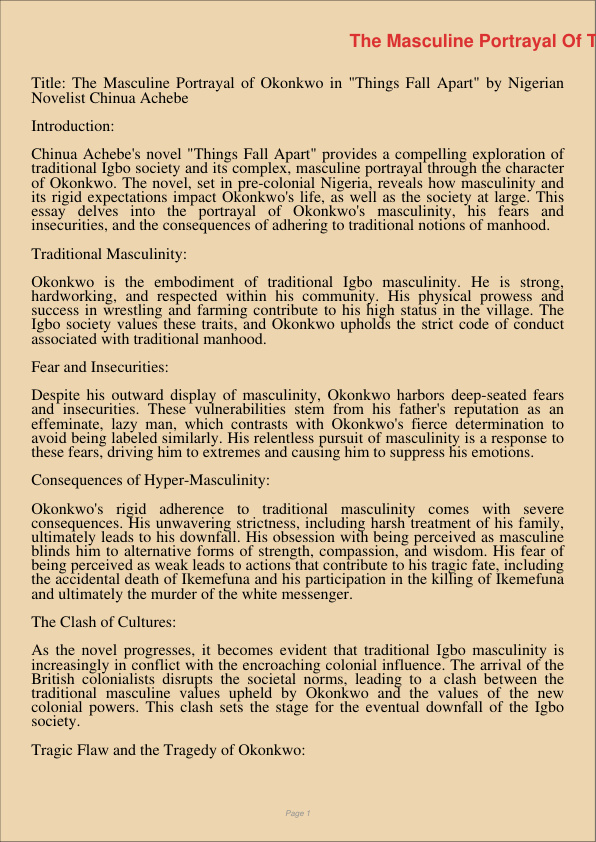Title: The Masculine Portrayal of Okonkwo in “Things Fall Apart” by Nigerian Novelist Chinua Achebe
Introduction:
Chinua Achebe’s novel “Things Fall Apart” provides a compelling exploration of traditional Igbo society and its complex, masculine portrayal through the character of Okonkwo. The novel, set in pre-colonial Nigeria, reveals how masculinity and its rigid expectations impact Okonkwo’s life, as well as the society at large. This essay delves into the portrayal of Okonkwo’s masculinity, his fears and insecurities, and the consequences of adhering to traditional notions of manhood.
Traditional Masculinity:
Okonkwo is the embodiment of traditional Igbo masculinity. He is strong, hardworking, and respected within his community. His physical prowess and success in wrestling and farming contribute to his high status in the village. The Igbo society values these traits, and Okonkwo upholds the strict code of conduct associated with traditional manhood.
Fear and Insecurities:
Despite his outward display of masculinity, Okonkwo harbors deep-seated fears and insecurities. These vulnerabilities stem from his father’s reputation as an effeminate, lazy man, which contrasts with Okonkwo’s fierce determination to avoid being labeled similarly. His relentless pursuit of masculinity is a response to these fears, driving him to extremes and causing him to suppress his emotions.
Consequences of Hyper-Masculinity:
Okonkwo’s rigid adherence to traditional masculinity comes with severe consequences. His unwavering strictness, including harsh treatment of his family, ultimately leads to his downfall. His obsession with being perceived as masculine blinds him to alternative forms of strength, compassion, and wisdom. His fear of being perceived as weak leads to actions that contribute to his tragic fate, including the accidental death of Ikemefuna and his participation in the killing of Ikemefuna and ultimately the murder of the white messenger.
The Clash of Cultures:
As the novel progresses, it becomes evident that traditional Igbo masculinity is increasingly in conflict with the encroaching colonial influence. The arrival of the British colonialists disrupts the societal norms, leading to a clash between the traditional masculine values upheld by Okonkwo and the values of the new colonial powers. This clash sets the stage for the eventual downfall of the Igbo society.
Tragic Flaw and the Tragedy of Okonkwo:
Okonkwo’s tragic flaw is his unwavering commitment to traditional masculinity. His determination to prove himself as a man, coupled with his refusal to adapt to changing circumstances, ultimately results in his personal tragedy and the decline of his clan. The novel ends with Okonkwo’s suicide, a powerful representation of the consequences of unyielding adherence to traditional gender norms.
Conclusion:
Chinua Achebe’s portrayal of Okonkwo in “Things Fall Apart” serves as a complex exploration of traditional masculinity in Igbo society. Okonkwo’s rigid adherence to traditional notions of manhood, driven by his fear of emulating his father’s perceived weakness, leads to his own downfall and the tragic consequences for his community. The clash between traditional masculinity and colonial influence highlights the broader societal changes occurring during this period in Nigerian history. Through Okonkwo, Achebe offers a thought-provoking commentary on the limitations of rigid gender roles and the devastating effects of an unyielding commitment to traditional masculinity.

「真诚赞赏,手留余香」
真诚赞赏,手留余香
使用微信扫描二维码完成支付
